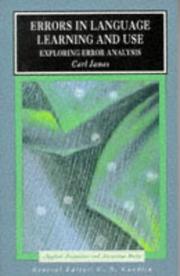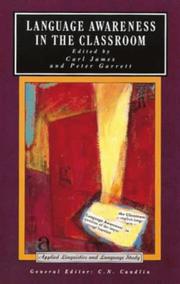| Listing 1 - 10 of 26 | << page >> |
Sort by
|

ISBN: 9780582257634 0582257638 9781315842912 9781317890287 9781317890294 9781138836723 Year: 2013 Publisher: Harlow Longman, an imprint of Pearson Eductaion
Abstract | Keywords | Export | Availability | Bookmark
 Loading...
Loading...Choose an application
- Reference Manager
- EndNote
- RefWorks (Direct export to RefWorks)
Didactics of languages --- Language and languages --- Study and teaching --- Error analysis --- 802.0-07 --- Engels: taalonderwijs; taalverwerving --- Taalverwerving --- Vreemdetalenonderwijs --- Error analysis. --- foutenanalyse --- didactiek --- 802.0-07 Engels: taalonderwijs; taalverwerving --- foutenanalyse. --- Foutenanalyse. --- Didactiek --- Foreign languages --- Languages --- Anthropology --- Communication --- Ethnology --- Information theory --- Meaning (Psychology) --- Philology --- Linguistics --- Study and teaching&delete& --- Error analysis in language teaching --- Errors --- Language and languages - Study and teaching - Error analysis

ISBN: 0582553709 9780582553705 Year: 1981 Publisher: London Longman
Abstract | Keywords | Export | Availability | Bookmark
 Loading...
Loading...Choose an application
- Reference Manager
- EndNote
- RefWorks (Direct export to RefWorks)
Contrastive linguistics --- Linguistique contrastive --- #KVHA:Taalkunde --- #KVHA:Linguistiek --- Didactics of languages --- Comparative linguistics --- Linguistics --- Contrastive linguistics.

ISBN: 080207779X 9786611997267 1281997269 1442678380 9781442678385 9781281997265 080202954X 9780802077790 9780802029546 Year: 1996 Publisher: Toronto, [Ontario] ; Buffalo, [New York] ; London, [England] : University of Toronto Press,
Abstract | Keywords | Export | Availability | Bookmark
 Loading...
Loading...Choose an application
- Reference Manager
- EndNote
- RefWorks (Direct export to RefWorks)
Today's social services agencies are faced with the challenge of responding to the diverse needs and expectations of a growing multicultural population. This volume examines race and racism in Canada from historical and contemporary perspectives and explores the extent to which these factors operate within social services systems related to immigration, settlement, the justice system, health, and education. The contributors, including practitioners, educators, and policy makers, argue for specific changes in current approaches to service delivery and provide practical suggestions for services that make it possible for various communities to be served more effectively. The collection also proposes an anti-racism approach to service provision to produce a system that is beneficial to all Canadians, particularly Aboriginals and racial and ethnic minorities.
Minorities --- Racism --- Human services --- Services, Human --- Ethnic minorities --- Foreign population --- Minority groups --- Persons --- Assimilation (Sociology) --- Discrimination --- Ethnic relations --- Majorities --- Plebiscite --- Race relations --- Segregation --- Services for --- Canada --- Kanada. --- Kanada --- Canada. --- Canada (Province) --- Canadae --- Ceanada --- Chanada --- Chanadey --- Dominio del Canadá --- Dominion of Canada --- Jianada --- Kʻaenada --- Kaineḍā --- Ḳanadah --- Kanadaja --- Kanadas --- Ḳanade --- Kanado --- Kanakā --- Province of Canada --- Republica de Canadá --- Yn Chanadey --- Puissance du Canada --- Kanadier --- Provinz Kanada --- 01.07.1867 --- -Minorities
Book
ISBN: 9780262015349 Year: 2011 Publisher: Cambridge, Mass. : ©2011 MIT Press,
Abstract | Keywords | Export | Availability | Bookmark
 Loading...
Loading...Choose an application
- Reference Manager
- EndNote
- RefWorks (Direct export to RefWorks)
Klagge draws on the full range of evidence, including Wittgenstein's published work, correspondence, lectures, and conversations to place Wittgenstein's work in a broad context along a trajectory of thought that includes Job, Goethe, and Dostoyevsky.
Wittgenstein, Ludwig, --- Wei-tʻe-ken-ssu-tʻan, --- Wei-tʻe-ken-ssu-tʻan, Lu-te-wei-hsi, --- Wittgenstein, L. --- Vitgenshteĭn, L., --- Wei-ken-ssu-tʻan, --- Pitʻŭgensyutʻain, --- Vitgenshteĭn, Li︠u︡dvig, --- Weitegenshitan, --- Wittgenstein, Ludovicus, --- Vitgenshtaĭn, Ludvig, --- ויטגנשטיין, לודוויג --- 维特根斯坦, --- Wittgenstein, Ludwig Josef Johann,
Book
ISBN: 0262525909 026201534X 9786613302922 0262300117 1283302926 9780262300117 9781283302920 9780262015349 0262300125 Year: 2011 Publisher: Cambridge, Mass. MIT Press
Abstract | Keywords | Export | Availability | Bookmark
 Loading...
Loading...Choose an application
- Reference Manager
- EndNote
- RefWorks (Direct export to RefWorks)
Klagge draws on the full range of evidence, including Wittgenstein's published work, correspondence, lectures, and conversations to place Wittgenstein's work in a broad context along a trajectory of thought that includes Job, Goethe, and Dostoyevsky.
PHILOSOPHY --- History & Surveys / Modern --- Philosophy & Religion --- Philosophy --- Wittgenstein, Ludwig, --- Philosophy, German. --- German philosophy --- Wei-tʻe-ken-ssu-tʻan, --- Wei-tʻe-ken-ssu-tʻan, Lu-te-wei-hsi, --- Wittgenstein, L. --- Vitgenshteĭn, L., --- Wei-ken-ssu-tʻan, --- Pitʻŭgensyutʻain, --- Vitgenshteĭn, Li︠u︡dvig, --- Weitegenshitan, --- Wittgenstein, Ludovicus, --- Vitgenshtaĭn, Ludvig, --- ויטגנשטיין, לודוויג --- 维特根斯坦, --- PHILOSOPHY/General --- HUMANITIES/Biography & Autobiography --- Wittgenstein, Ludwig Josef Johann,

ISBN: 0582067375 9780582067370 Year: 2003 Publisher: London Longman
Abstract | Keywords | Export | Availability | Bookmark
 Loading...
Loading...Choose an application
- Reference Manager
- EndNote
- RefWorks (Direct export to RefWorks)
Psycholinguistics --- Didactics of English --- Chez l'enfant --- Language and languages --- Language awareness --- Linguistic awareness --- Metalinguistic knowledge --- Awareness --- Foreign language study --- Language and education --- Language schools --- Study and teaching --- Language awareness. --- Study and teaching. --- Conscience linguistique --- Langues --- Langage --- Étude et enseignement --- Acquisition --- Langage et langues --- Etude et enseignement --- Acquisition du langage. --- Étude et enseignement. --- Chez l'enfant. --- Language and languages Study and teaching --- Language and languages - Study and teaching. --- Étude et enseignement
Book
ISBN: 9780262045834 0262365545 9780262365543 0262045834 0262365537 Year: 2021 Publisher: Cambridge, Massachusetts : The MIT Press
Abstract | Keywords | Export | Availability | Bookmark
 Loading...
Loading...Choose an application
- Reference Manager
- EndNote
- RefWorks (Direct export to RefWorks)
"Original interpretation of Wittgenstein's life and work. Argues that W's military experience in WWI subtly influenced his conception of how philosophy should be understood and practiced"--
Wittgenstein, Ludwig, --- Literary style. --- Wei-tʻe-ken-ssu-tʻan, --- Wei-tʻe-ken-ssu-tʻan, Lu-te-wei-hsi, --- Wittgenstein, L. --- Vitgenshteĭn, L., --- Wei-ken-ssu-tʻan, --- Pitʻŭgensyutʻain, --- Vitgenshteĭn, Li︠u︡dvig, --- Weitegenshitan, --- Wittgenstein, Ludovicus, --- Vitgenshtaĭn, Ludvig, --- ויטגנשטיין, לודוויג --- 维特根斯坦, --- Wittgenstein, Ludwig Josef Johann, --- PHILOSOPHY / Individual Philosophers --- PHILOSOPHY / Mind & Body --- LITERARY CRITICISM / Poetry
Book
ISBN: 9780367465568 9780367466336 Year: 2022 Publisher: New York, NY : Routledge,
Abstract | Keywords | Export | Availability | Bookmark
 Loading...
Loading...Choose an application
- Reference Manager
- EndNote
- RefWorks (Direct export to RefWorks)
"Ludwig Wittgenstein's brief Tractatus Logico-Philosophicus (1922) is one of the most important philosophical works of the Twentieth Century, yet it offers little orientation for the reader. The first-time reader is left wondering what it could be about, and the scholar is left with little guidance for interpretation. In Tractatus in Context, James C. Klagge presents the vital background necessary for appreciating Wittgenstein's gnomic masterpiece. Tractatus in Context contains the early reactions to the Tractatus, including the initial reviews written in 1922-1924. And while we can't talk with Wittgenstein, we can do the next best thing-hear what he had to say about the Tractatus. Klagge thus presents what Wittgenstein thought about germane issues leading up to his writing the book, in discussions and correspondence with others about his ideas, and what he had to say about the Tractatus after it was written-in letters, lectures and conversations. It offers, you might say, Wittgenstein's own commentary on the book. Key Features: Illuminates what is at stake in the Tractatus, by providing the views of others that engaged Wittgenstein as he was writing it. Includes Wittgenstein's earlier thoughts on ideas in the book as recorded in his notebooks, letters, and conversations as well as his later, retrospective comments on those ideas. Draws on new or little-known sources, such as Wittgenstein's coded notebooks, Hermine's notes, Frege's letters, Hänsel's diary, Ramsey's notes, and Skinner's dictations. Draws connections between the background context and specific passages in the Tractatus, using a proposition-by-proposition commentary"--
Logic, Symbolic and mathematical. --- Language and languages --- Philosophy. --- Wittgenstein, Ludwig,
Book
Year: 1966 Publisher: London University of Illinois Press
Abstract | Keywords | Export | Availability | Bookmark
 Loading...
Loading...Choose an application
- Reference Manager
- EndNote
- RefWorks (Direct export to RefWorks)
Book
Year: 1966 Publisher: Urbana The University of Illinois Press
Abstract | Keywords | Export | Availability | Bookmark
 Loading...
Loading...Choose an application
- Reference Manager
- EndNote
- RefWorks (Direct export to RefWorks)
| Listing 1 - 10 of 26 | << page >> |
Sort by
|

 Search
Search Feedback
Feedback About UniCat
About UniCat  Help
Help News
News